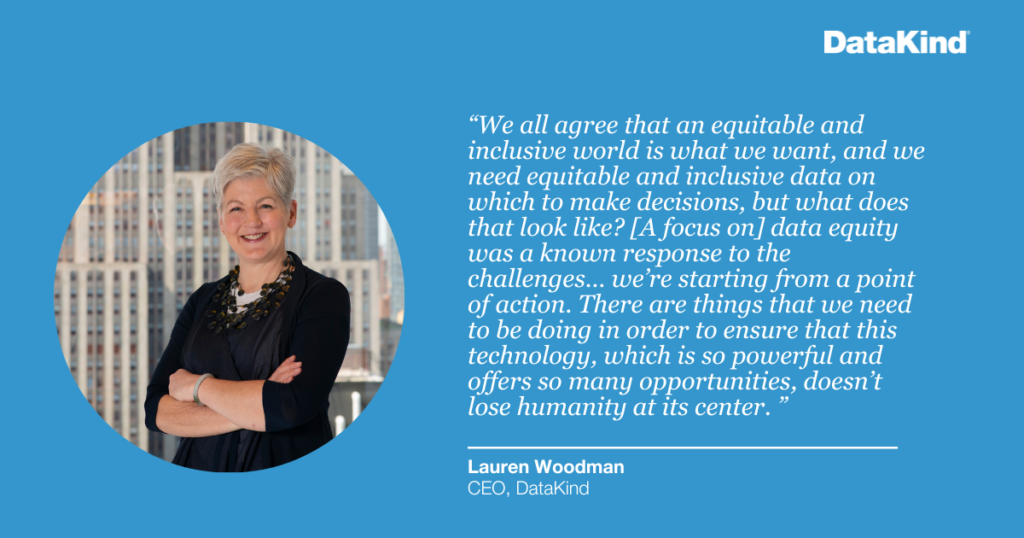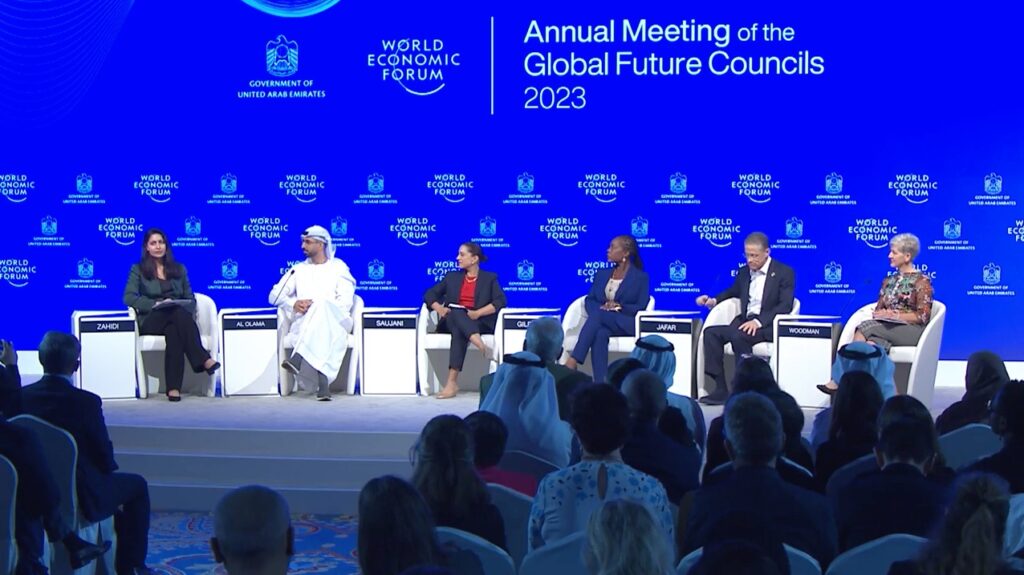(Image: DataKind CEO Lauren Woodman (far right) speaks at the closing plenary with moderator Saadia Zahidi, and panelists Reshma Saujani, Omar Sultan Al Olama, Nili Gilbert, and Badr Jafar.)
The World Economic Forum’s network of Global Future Councils is an interdisciplinary community of government, business, and civil society leaders that support the Forum’s mission by identifying, discussing, and proposing approaches to critical global issues. With a forward-looking focus, Council members share their insights and shape future agendas and actions.
As the world increasingly turns to data to address urgent global challenges, data ecosystems risk perpetuating known inequalities, embedded biases, and existing power dynamics. And as the use of Generative Artificial Intelligence (GenAI) rapidly grows, concern that these systems can exacerbate current inequalities and give rise to new ones is also increasing.
DataKind has long been an advocate for responsible data use. We’re working with a variety of partners as a member of the Global Future Council on the Future of Data Equity to address the unique questions that GenAI poses. Our recent white paper, Data Equity: Foundational Concepts for Generative AI, defines the challenges and opportunities.

The paper identifies classes of data equity and explores data equity concerns in each class across the data lifecycle. Addressing data equity in this rapidly growing space will take time and proactive effort, but our goals with the paper were to identify early concerns, establish a common vocabulary to facilitate collaboration, and define a framework for inquiry. Our recent paper and collaborative discussions will guide our efforts as we seek to shape future development of promising technologies proactively and positively.
During the closing plenary, DataKind CEO, Lauren Woodman, representing the council on the Future of Data Equity, joined members of the Global Future Councils on the Future of Philanthropy for Climate and Nature, Future of the Care Economy, and Omar Sultan Al Olama, Minister of State for Artificial Intelligence, Digital Economy, and Remote Work Applications of the UAE, to draw conclusions and share insights from the meeting. Global cooperation, which can also enable trust and transparency, will be critical to combining innovation and AI regulation while aligning decarbonization objectives with social goals.
Other key insights from the annual meeting:
Insights from the session, AI as a Driving Force for Industry and Economy, underscored AI’s potential to augment industries, create jobs, and improve productivity, while noting the requirement of purposeful implementation, quality data sources, and AI literacy via carefully curated AI governance, guidelines and regulations, and an international treaty for AI safety.
In the session, Is AI a Source for Good?, participants discussed to what extent human decision-making and structural analysis are being outpaced by advancements in AI, which is underpinned by two elements – infrastructure and interface. Leaders also discussed the power distribution for those who control AI and its architecture.
During the session, From Abogamers to Prompt Engineers: Navigating a New World of Work, participants advocated for a focus on current and near-term risks, including understanding the “invisible” work generated by automation and augmentation, navigating bias and making reskilling and upskilling a collective priority.
Climate and energy specialists delved deeper into technology as a crucial enabler of progress on global net zero targets and the energy transition. During the deliberations, speakers explored a range of forward-looking tech solutions, which could also address some immediate issues in the short-to-medium term, as well as ways to scale and maximize their impact.
The Global Future Council on Cybersecurity examined public health as the societal effort to identify and analyze the health risk factors at the population level to increase global health. Similarly, in cyberspace, adopting three public health approaches (data-driven investigation, population-level analysis, and preventive approaches) can improve the risk resiliency of the ecosystem and revolutionize cybersecurity practices.



